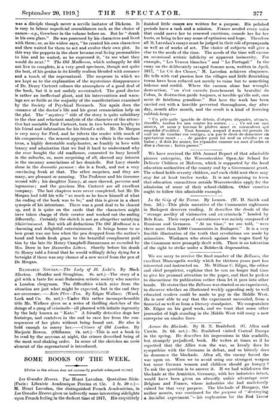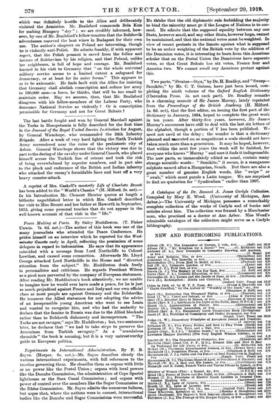Across the Blockade. By H. N. Brailsford. (G. Allen and
Lnwin. 2s. 6d. net.)—Mr. Brailsford visited Central Europe in the spring. He describes his impressions in this readable, but strangely prejudiced, book. He writes at times as if he regretted that the Allies won the war, so keenly does he sympathize with the Germans in defeat, and so bitterly does he denounce the blockade. After all, the enemy forced the war upon us. Were we to avoid using our strongest weapon lest some German women and children should go hungry ? To ask the question is to answer it. If we had withdrawn the blockade at the Armistice, Germany, with her industries intact, would have been given an absurdly unfair advantage over Belgium and France, whose industries she had maliciously ruined for that very purpose. The blockade of Hungary, the author asserts, was continued for the purpose of " destroying a Socialist experiment "—his euphemism for the Red Terror which was definitely hostile to the Allies and deliberately violated the Armistice. Mr. Brailsford commends Bela Kun for making Hungary " dry " ; we are credibly informed, how- ever, by one of Mr. Brailaford's fellow-tourists that the Bolshevik adventurers reserved the best wines in Budapest for their own use. The author's chapters on Poland are interesting, though he is violently anti-Polish. He admits frankly, if with apparent 'regret, that the Polish peasant is saved from the follies and horrors of Bolshevism by his religion, and that Poland, unlike her neighbours, is full of hope and courage. Mr. Brailsford learned in his visit to Germany that " on the whole universal military service seems to a limited extent a safeguard for democracy, or at least for its outer forms." This appears to us to be axiomatic. He finds fault with the Allies for insisting that Germany shall abolish conscription .and, reduce her army to 100,000 men—a force, he thinks, that will be too small to maintain order. May we assume, then, that Mr. Brailsford disagrees with his fellow-members of the Labour Party, who denounce National Service so violently ? Or is conscription permissible for Germany and not for Great Britain ?







































 Previous page
Previous page